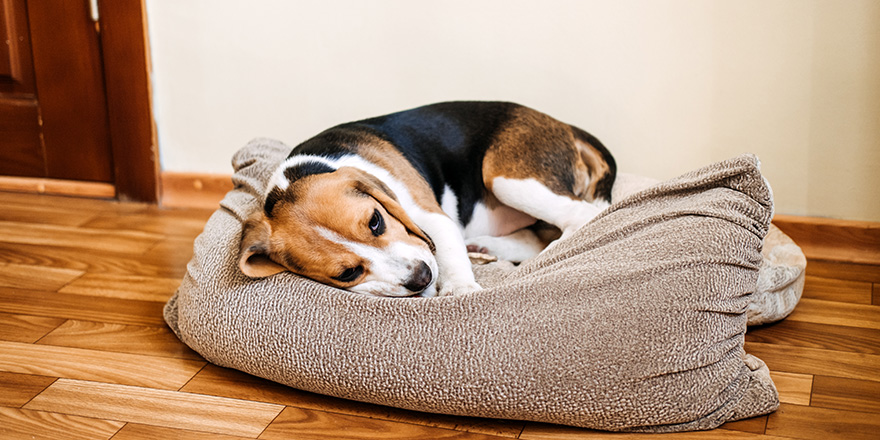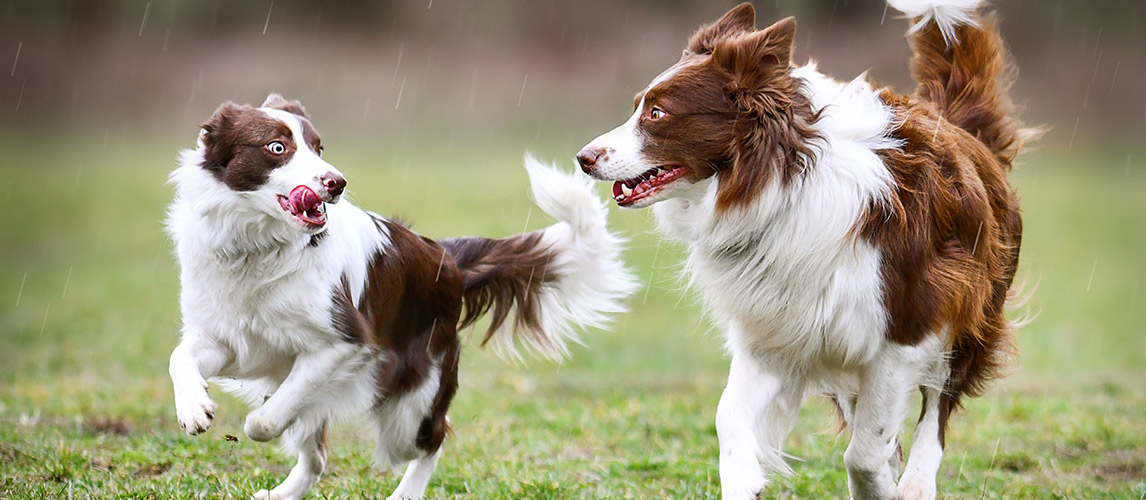As unpleasant as it is to smell the flatulence that your dog releases, excessive gas may be wreaking havoc with your dog’s tummy leaving them in discomfort or pain. Dog flatulence and occasional gas is common however if it seems to be more frequent than normal you may need to identify the problem behind it and apply a remedy to put your gassy dog at ease.
What Causes Flatulence in Dogs
The reasons why your dog may struggle with bad gas can be similar to why people suffer. The culprit can range from food allergies to spoiled foods, so it’s important to be able to identify the cause to be able to treat it appropriately.
Poor Diet
Feeding your dog low-quality food can be the offender behind the gas buildup. Sometimes these foods neglect crucial ingredients and will lack the best nutrition which is vital for their overall health and well-being.
In addition to this, human food can often be the cause of flatulence. If your dog is used to regularly receiving a few scraps from the table or leftover food they could be ingesting ingredients that are not suitable for them.
When your pup is given foods they cannot digest properly, it can cause excessive fermentation in your dog’s digestive tract. This includes inappropriate human foods and low-quality dog food. Some veg, such as beans, and a number of fatty foods with not enough probiotics will work against digestion and cause bad gas build-up which can be uncomfortable.
Food Allergies
Like people, dogs can develop allergies and intolerances to specific ingredients and as a result, their stomachs will react badly. This will often cause smelly, excess gas.
Lactose Products
Dogs can develop an allergy to lactose if exposed to dairy products over time which can seriously damage their stomach. This is because their bodies can no longer break down the formula during digestion causing gas. Avoiding milk products may help reduce your dog’s flatulence if you have treated them to dairy in the past.
Spoiled Foods
Bad gas may be the result of dogs eating food that’s past its prime. Often, eating spoiled food can simply result in flatulence, however, dogs can develop food poisoning depending on the quality of the food and how much they ate.
Health Issues
If you are concerned that a health problem could be behind your dog’s stomach issues, talk to your veterinarian to get some advice. Your vet can run tests to determine whether this is the case or not.
Some severe health issues that can cause bad gas may be:
- Irritable bowel syndrome
- Inflammatory bowel disease
- Pancreatitis
- Cancer
- Intestinal parasites
Swallowing Air
If a dog eats too quickly it can also swallow too much air resulting in gas however they can often burp instead.
Breeds that can develop respiratory issues are more likely to swallow a lot of air when eating. These tend to be Brachycephalic dogs such as Boxers, Boston Terriers, and French Bulldogs.

Home Remedies for Dog Gas
Before we address some of the foods and supplements you can give to your dog, take a look at these remedies that could potentially give your dog gas relief.
1. Slow Down Quick Eaters
Some dogs will try to break the world record of speed eating when it comes to mealtimes which can cause dogs to build up gas. If this is the case, you can purchase a slow-feed dog dish for your dog which will prevent them from wolfing down large amounts of food in one go.
Alternatively, you can separate your dog’s daily food into smaller meals and space them out throughout the day.
2. No More Dog Table Scraps
No matter how cute they are when they stare at you with big puppy-dog eyes, resist the urge to give them a scrap or two at dinner. A lot of human foods, including fruits and vegetables, can be mildy harmful and even dangerous to most dogs. So it’s important you keep them away from your dinner regardless of what’s on your plate whilst you deliberate the cause of your dog’s farts.
If you’re unsure what your dog can and can’t eat, it may be worth exploring our food archives as we have many convenient guides detailing what foods can be good or bad for your companion.
3. Change In Diet
Changing your dog’s diet may have a significant effect on your dog’s health. Choosing a high-quality diet specifically designed to care for your pooch’s stomach may prevent conditions from exacerbating and help build their immune system back up without overwhelming them with unnecessary additives and ingredients.
Fortunately, there are plenty of foods, rich in nutrients, that are developed to help dogs with specific needs. In this case, you can find dog food diets that are made to combat flatulence. You can also find formulas with limited ingredients if you suspect an allergy is the culprit behind your dog’s gas problems.
If you need recommendations choosing the best food for your dog’s gas, take a look at our guide detailing the best picks from varying well-known dog food brands.
4. Physical Exercise
Regular walks will help your dog’s body maintain a healthy weight if they struggle to shake the excess pounds. Frequent exercise will also keep their system moving which will assist their digestive system.
What Can You Give a Dog for Gas?
If you’re looking for foods or supplements to help treat frequent or smelly flatulence, take a look at the options below to make your own dog Gas X equivalent.
1. Parsley
Fresh parsley is a herb that has many benefits for your dog’s health. Most notably, parsley will help to reduce odor in the stomach and well as neutralizing the bad bacteria that causes bad breath.
Usage:
Chop up a few tablespoons of curly parsley and add it to your dog’s food a couple of times a week.
Warning: Do not feed pregnant dogs parsley as it can stimulate their uterus causing problems in their birth/pregnancy.
2. Ginger
This spicy root herb has been used to help digestive issues for years, including diarrhea, bloating, and nausea. Ginger can help expel the trouble in your dog’s stomach which will relieve smelly gas and further aid healthy digestion.
Usage:
Feeding a dog with digestive issues spicy foods may not seem like the best approach which is why this herb must be given in small doses. Peel and mince the root then add the recommended amount (see below) to your dog’s meal. At first, you may want to only incorporate a small amount so that your pooch gets used to the addition.
- Half a teaspoon for small/medium dogs
- 3/4 of a teaspoon for large dogs.
3. Yogurt
Not just any yogurt. Plain yogurt can be added to help prevent and treat dog gas as they contain probiotics that will aid their digestive system. The addition of these probiotics can also help to boost the immune system. Plain Greek-style yogurt is also a good option as it tends to contain a lower level of lactose.
Usage:
As a treat, give your dog no more than a tablespoon of yogurt once a day. If you notice the gas doesn’t go, or gets worse, stop using yogurt immediately.
Warning:
Make sure the yogurt contains no Xylitol or artificial sweeteners as they are toxic to dogs. Lactose is also difficult for adult dogs to break down so moderation is key when giving dogs these dairy products.
4. Pumpkin
Pumpkin is well known for aiding a dog’s digestive system and can help to prevent constipation or relieve diarrhea. The addition of pumpkin will support the activity of good bacteria in your dog’s digestive tract.
Usage:
At the beginning of the year, fresh pumpkin may not be as accessible however you can purchase canned pumpkin which will still hold the same benefits. A tablespoon can be added to your dog’s food once a day to ease digestion and to help prevent flatulence. Alternatively, toasted seeds can be added to plain yogurt.
Warning:
Pumpkin pie filling is tasty but not the same as canned pumpkin. This variation contains a lot of sugar that will be damaging to your dog.
5. Peppermint Oil
A few drops of peppermint oil can often help settle nausea and GI distress in dogs however it must be used in moderation with fresh peppermint as the prime and only ingredient.
Usage:
Chop up small amounts and add it to your dog’s meal. Or rather, you can make your own oil by steaming the leaves of peppermint to gain peppermint oil. Once you have your oil, you can add a few drops to your dog’s water dish.
Warning:
If peppermint isn’t clearing your dog’s gas stop using it. Consult a vet if your dog is receiving homeopathic treatments before giving them peppermint.

6. Probiotics
Talk to your dog’s veterinarian regarding the best probiotics to give to your furry friend as a dog flatulence remedy. These are available in a number of forms such as capsules and powder and can greatly benefit your dog’s diet whilst combatting digestive problems. They can also help to boost their immune systems and maintain a positive level of good bacteria.
Similar supplements recommended by your vet will contain blends of natural ingredients and digestive enzymes to help their stomach process foods better. The organic blends will also not overwhelm their systems with unnecessary additives.







